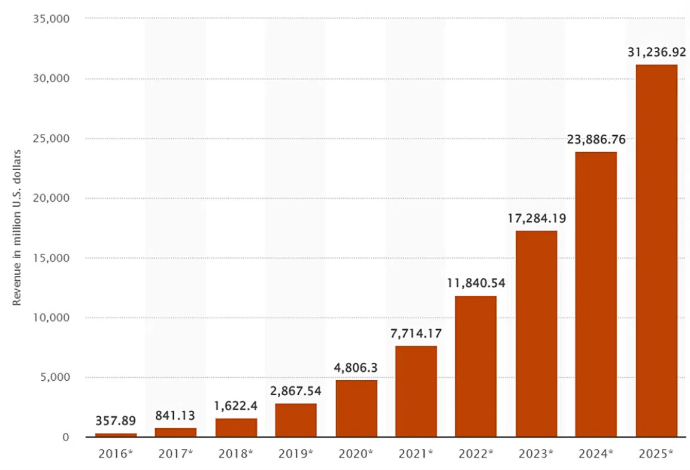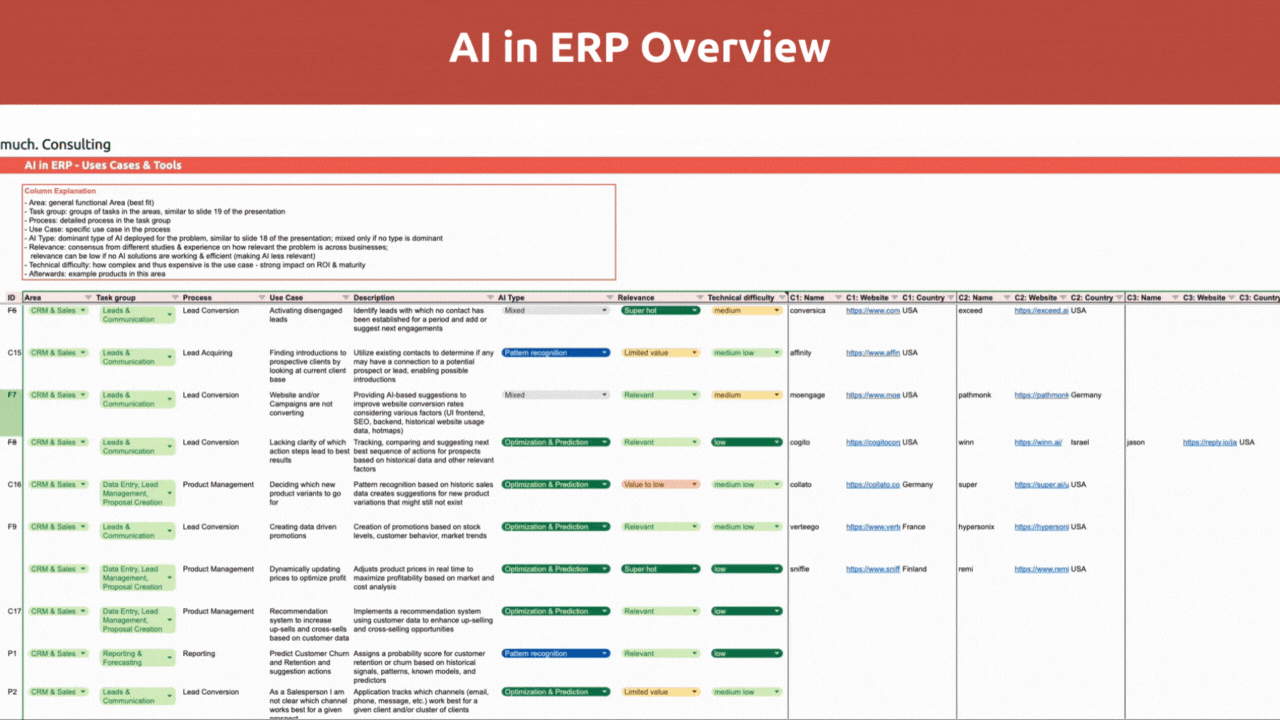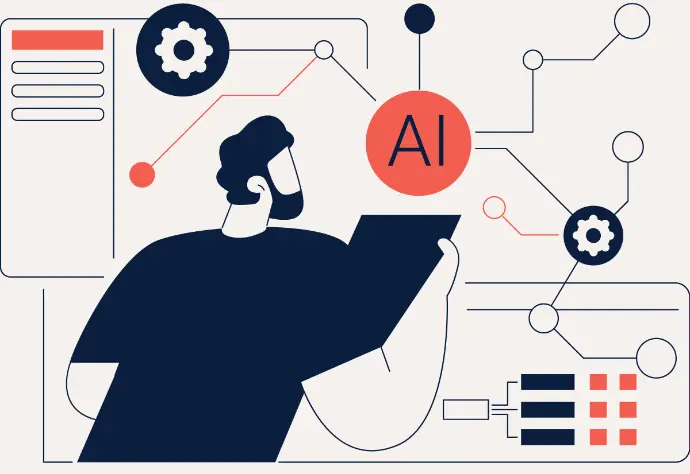Everything you need to know about AI integration in ERP!
Are you interested in learning how to optimise your ERP business processes using AI? You’ve come to the right place! We will focus on the strategic and targeted application of AI technologies within ERP processes.
If you’re looking for a more general introduction to AI, we have also compiled some of the most relevant and interesting insights at the end of this page!
AI, yes please! But which, where & how?
The adoption of Artificial Intelligence (AI) within companies is rapidly gaining momentum. In 2022, 79% of managers reported the integration of multiple AI applications across various business areas. This trend has only intensified since the introduction of ChatGPT at the end of the same year – a platform that garnered a record 100 million users in just two months following its launch.
However, as public interest heightens and emphasis on AI implementation continues to grow, companies mostly still lack a clear strategy to leverage the technology effectively in their business processes and yield in significant results.
Based on a survey of more than 2,600 business leaders, the main challenges for effective AI integration in business processes include:
- Confirmation of business value (37%)
- Selection of appropriate AI technologies (38%)
- Identification of use cases with the highest business value (42%)
- Integration with the existing system landscape (44%)
- Incorporation of AI into daily business operations (46%)
This data underscores the fact that simply adopting AI without a well-defined strategy is not enough. To truly leverage its potential for your company’s operations, it is crucial to have a clear AI roadmap. Such a roadmap ensures that your investments will be redirected to where they can achieve their maximum ROI!
The future is now – why developing your own ERP AI strategy can’t wait
The signs are clear: companies that have implemented AI into their operations at an early stage are already achieving impressive results. According to expert forecasts, this trend is just beginning. Now is the right moment for you to take action and tackle the challenge of AI integration head-on!
Companies with AI-driven processes are already reporting considerable positive effects in:
- Significant cost reductions (37%)
- Significant increase in sales (31%)
- Gaining valuable business insights (34%)
- Increased efficiency of business processes (33%)
- Improved decision making (32%)
- Precise demand forecasting (32%)
According to forecasts, these trends are expected to only grow in the coming years:
- AI could elevate average corporate profitability by up to 38% in 16 different industries by 2035
- AI is expected to boost labor productivity by as much as 40%, in 12 of the world’s leading industrialised nations
- AI could double growth rates in the aforementioned 12 leading industrialised countries.
Please note: AI can enhance your ERP, not replace it!
Think of AI methods as metal detectors, finely tuned to uncover valuable data treasures hidden within your expansive company landscape. However, much like a metal detector can point out where the treasures are buried but can’t do the digging, AI spots opportunities that require further action.
On the other hand, ERP systems are like your reliable mining crew, equipped to efficiently dig and process materials according to instructions. However, they operate blindly and without a map or detector, they are unaware of the exact locations of the most valuable deposits.
If we combine the precision of the metal detector (AI) with the efficiency of the mining team (ERP), a powerful synergy can be created. This combination will empower companies to not only identify the most valuable data deposits but also to extract and utilise them strategically, while boosting profits and productivity across operations.
From a technical POV, there are fundamental differences between ERP software and AI:
ERP vs AI Data Models
ERP Data Models
ERP softwares rely on structured data models featuring predefined schemas. These models are hierarchical in nature and are designed to oversee specific business entities like customers, products, and orders.
AI Data Models
AI systems offer greater flexibility and have the capacity to handle unstructured or semi-structured data. They can utilise various data sources and types, including text, images, and sensor values.
ERP vs AI Objectives
ERP Objectives
The primary goal of ERP software is to streamline operational processes, organise data, and facilitate transactions. Traditionally, it serves as a backbone for a company’s operational tasks.
AI Objectives
AI aims to emulate human-like intelligence to address intricate challenges, make predictions, and extract insights from data. AI technology is designed to bolster data-driven decision-making and generate novel insights.
ERP vs AI Processing Methods
ERP Processing Methods
ERP software automates business processes and transactions by adhering to predefined rules and logic. It efficiently handles tasks such as inventory management, order processing, and accounting.
AI Processing Methods
AI relies on data analysis and machine learning techniques. AI algorithms learn from data, identifying patterns and relationships to make predictions, decisions, and gain insights.
ERP vs AI Implementation
ERP Implementation
ERP software is typically configured or customised to align with a company’s unique business processes. Achieving this alignment requires thorough implementation and configuration efforts tailored to meet the business’s specific requirements.
AI Implementation
Implementing AI systems frequently involves an iterative approach to machine learning and model development. These systems undergo training to analyse data, identify patterns, and make predictions or decisions.
Get access to an expert analysis of 400+ tools for ERP & AI integration
So how can you effectively integrate AI into your own ERP processes?
Integrating Artificial Intelligence (AI) into ERP systems unlocks a wide range of opportunities for companies to elevate their business processes to a new level of efficiency.
When integrating ERP software with AI technologies, data from the ERP system can serve as input for the AI tool. This enables deeper data analysis and predictions regarding various aspects of the company, such as business processes and customer behaviour. AI models play a crucial role in recognising patterns within ERP data, conducting complex analyses, and delivering valuable insights.
Consequently, results derived from AI analyses can be fed back into the ERP system to enhance operational decision-making. For instance, AI-generated sales forecasts can be utilised to fine-tune production planning within ERP systems or even to effectively manage marketing campaigns based on segmented customer data.
However, considering the wide array of AI tools available, it’s essential to approach this technology with a clear strategy and a careful evaluation of its benefits. To achieve this successfully, companies must first identify the business areas in their processes where there is the greatest potential for efficiency gains through AI. Simultaneously, it is important to determine the appropriate AI tools that meet each organisation’s specific needs and relevant use cases.
Figure 1: Global AI for enterprise applications market from 2016 to 2025
As AI grows, so does investment in AI-driven ERP solutions.

Source: Statista

Want to develop an AI strategy for your ERP and don’t know where to start?
Expert talk – how can you succeed with ERP in the age of AI?
Now’s the time to step into the future of ERP with AI! Watch the expert talk by our managing partner Simon Stappen below to explore the transformative potential of AI in ERP systems. He will give you an overview of how AI can revolutionise your business processes and share valuable insights from real-world use cases in the context of Odoo ERP. You will learn about:
- Why ERPs are uniquely positioned to leverage AI value
- Which AI technologies show high ROI potential for ERP integration
- How to bring AI technology into your Odoo ERP
- Examples of AI integration in real Odoo ERP projects
The big AI ERP study – Request our expert analysis of over 400 AI tools
We’ve analysed over 400 AI tools and gathered the most relevant in our comprehensive insight list. You can find a detailed process overview and valuable AI use cases in ERP. Curious to see what it includes? Check the summary below!
- Explore specific use cases of AI in ERP, grouped by main AI types
- Assess the relevance of each AI tool per use case, based on expert consensus and hands-on experiences
- Evaluate the technical difficulty and complexity of implementing AI tools in ERP, as well as its impact on ROI
- Find examples of available AI tools for seamless integration with ERP systems.
Get in touch with us today and gain access to our encompassing overview. Discover where ERP meets AI with practical use cases and leverage this valuable information to elevate your business operations!

Ready to dive into AI with our experts? Get in touch now!
Fill out the form to discuss the future of AI and ERP with us!
Step into the world of AI – insights & resources for a smooth start
Introduction
AI QuickStart Cheat Sheet – Philipp Klöckner
A Primer to Foundation Models (FM) – Intro to LLMs by Davis Treybig
Generative AI: How Will the Next Era of Machine Learning Effect You – Financial Times
AI 2022: The Explosion – Coatue
GPT Models Explained and Compared – MUO
Drilling Down AI Training Data Sets – Gregoreite.com
Reports
AI Index Report – Stanford HAI
State of AI – McKinsey
Modeling the Impact of AI on Global Economy – McKinsey
Sizing the Price – PWC AI Study
How AI Boosts Industry Profits and Innovation – Accenture
Global AI Adoption Report – IBM
Industry Specific Overview
Sequoia AI 50 2023 – 50 Most Important AI Projects
Sequoia Generative AI Landscape – Market Map
A16Z: Who’s Owning the Generative AI Platform – Andreessen’s View
Generative AI Companies >5MM USD raised – Kelvin Mu
Newsletters
Superhuman – AI News by Zain Khan
The Neuron Daily – Daily AI News Snippets
Prompt Engineering Daily – by Rez Karim


